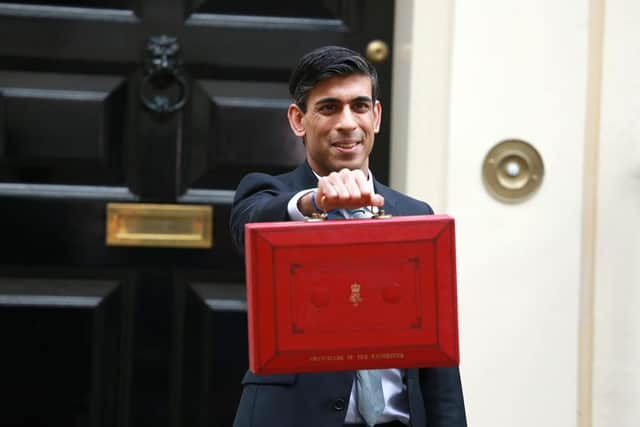Self employed income support: the UK Government’s new coronavirus help plan for workers explained - and how to claim
The Chancellor has said that self-employed people who are facing financial difficulties due to the ongoing health crisis will have 80 per cent of their wages covered by the government.
The financial package, which promises help for groups such as builders, taxi drivers, hairdressers and childminders, comes after the Government faced widespread criticism for not protecting the sector sooner.


80% of wages to be covered
Advertisement
Hide AdAdvertisement
Hide AdThe Chancellor announced that self-employed workers will be able to access a taxable grant that is worth 80 per cent of their average monthly profits over the last three years, up to the value of £2,500 per month.
The scheme will be open for at least three months across the UK, and will be extended if necessary.
The grant covers the same amount of income as the government has offered for furloughed employers, who have also been offered a grant worth 80 per cent.
When will the scheme be available?
Chancellor Rishi said HMRC is working urgently and he expects people to be able to access the scheme no later than the beginning of June.
If eligible, HMRC will contact workers with an online form and will then pay the grant straight into their bank account.
To ensure workers who need the grant do not miss out on support, the government is allowing anyone who was late in filing their tax return in January four weeks from today (26 Mar) to submit their tax return.
How much money will self-employed workers get?
The Chancellor has said the scheme will match that of the scheme offered to furloughed workers, ensuring the self-employed will receive 80 per cent of their earnings.
The payment will be based on average monthly profits over the last three years and will be capped at £2,500 per month
Advertisement
Hide AdAdvertisement
Hide AdSpeaking at the Downing Street press conference, Chancellor Rishi said: "To support those who work for themselves, today I am announcing a new self-employed income support scheme.
"The Government will pay self-employed people who have been adversely affected by the coronavirus a taxable grant worth 80 per cent of their average monthly profits over the last three years, up to £2,500 a month."
Who qualifies for the scheme?
The Chancellor said the scheme is only open to those with trading profits up to £50,000, who make a majority of their income from self-employment.
To minimise fraud, only those who are already in self-employment, who have a tax return for 2019, can apply for the scheme.
Other self-employed people, who also earn money separately as salaried employees, should be covered by the government’s Coronavirus Job Retention Scheme.
How can I apply?
People cannot apply for the scheme yet, but HMRC says if you are eligible for it they will contact you and invite you to apply online. It urged people not to contact them directly, and said doing so would only delay the “urgent work being undertaken to introduce the scheme”.
It also warned people that if they receive texts, calls, or emails claiming to be from HMRC that ask for financial details or to click a link in order to claim financial support or tax refunds, it is a scam.
What if I am employed by a company?
The government has urged businesses not to lay off staff amid the coronavirus pandemic, and has promised to help support them financially instead.
Advertisement
Hide AdAdvertisement
Hide AdLast week the Chancellor unveiled the Coronavirus Job Retention Scheme, which protects employed workers from layoffs and covers 80 per cent of their wages up to £2,500 a month.
If your employer intends to use the scheme, they will classify you as a furloughed worker, meaning you are kept on your employer’s payroll, rather than being laid off.
But while you are furloughed, you should not work for your employee.
The government says that your employer could choose to fund the differences between this furlough payment and your salary, but that it does not have to.
Coronavirus: the facts
What is coronavirus?
COVID-19 is a respiratory illness that can affect lungs and airways. It is caused by a virus called coronavirus.
What caused coronavirus?
The outbreak started in Wuhan in China in December 2019 and it is thought that the virus, like others of its kind, has come from animals.
How is it spread?
As this is such a new illness, experts still aren’t sure how it is spread. But, similar viruses are spread in cough droplets. Therefore, covering your nose and mouth when sneezing and coughing, and disposing of used tissues straight away is advised. Viruses like coronavirus cannot live outside the body for very long.
What are the symptoms?
The NHS states that the symptoms are: a dry cough, high temperature and shortness of breath - but these symptoms do not necessarily mean you have the illness. Look out for flu-like symptoms, such as aches and pains, nasal congestion, runny nose and a sore throat. It’s important to remember that some people may become infected but won’t develop any symptoms or feel unwell.
What precautions can be taken?
Advertisement
Hide AdAdvertisement
Hide AdWashing your hands with soap and water thoroughly. The NHS also advises to cover your mouth and nose with a tissue or your sleeve (not your hands) when you cough or sneeze; put used tissues in the bin immediately and try to avoid close contact with people who are unwell. Also avoiding touching eyes, nose and mouth unless your hands are clean.
Government advice
As of Monday 23 March the prime minister has put the UK into lockdown and instructed all citizens to stay at home. People can only leave their homes to exercise once a day, go shopping for food and medication, travel for medical needs or to care for a vulnerable person, and travel to work only if essential. Police will be able to enforce these restrictions.
All non-essential shops will close with immediate effect, as will playgrounds, places of worship and libraries. Large events or gatherings of more than two people cannot go ahead, including weddings and celebrations. Funerals can only be attended by immediate family.
Children of separated parents can go between both parents' homes.
Anyone with a cough or cold symptoms needs to self-isolate with their entire household for 14 days.
The government has now instructed bars, restaurants, theatres and non-essential businesses to close and will review on a ‘month to month’ basis. Schools closed from Friday 20 March for the foreseeable future, and exams have been cancelled.
The over 70s or anyone who is vulnerable or living with an underlying illness are being asked to be extra careful and stay at home to self-isolate. People with serious underlying health conditions will be contacted and strongly advised to undertake "shielding" for 12 weeks.
For more information on government advice, please check their website.
Should I avoid public places?
Advertisement
Hide AdAdvertisement
Hide AdYou should now avoid public places and any non-essential travel. Travel abroad is also being advised against for the next 30 days at least, and many European countries have closed their borders.
What should I do if I feel unwell?
Don’t go to your GP but instead look online at the coronavirus service that can tell you if you need medical help and what to do next.
Only call 111 if you cannot get help online.
When to call NHS 111
Only call NHS 111 if you can’t get help online and feel very unwell. This should be used if you feel extremely ill with coronavirus symptoms. If you have been in a country with a high risk of coronavirus in the last 14 days or if you have been in close contact with someone with the virus please use the online service.
Sources: World Health Organisation and NHS
